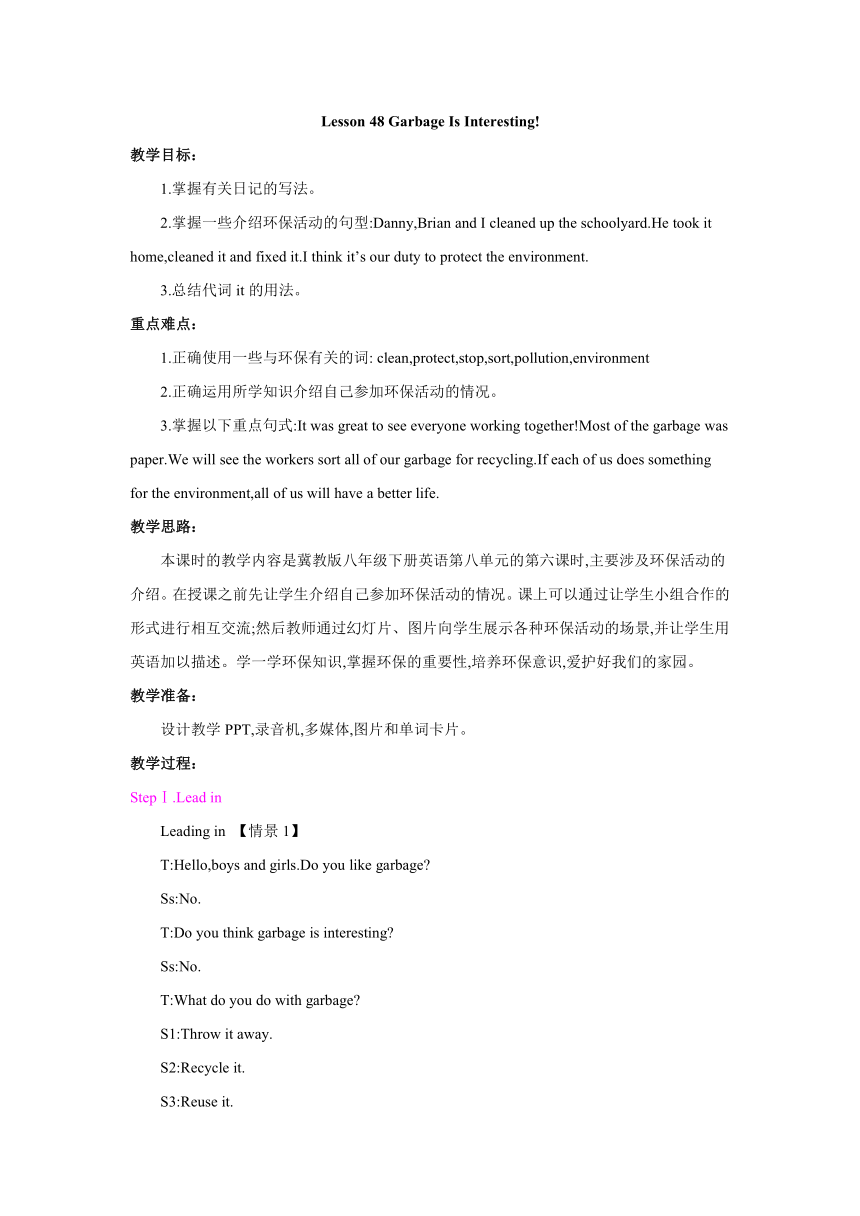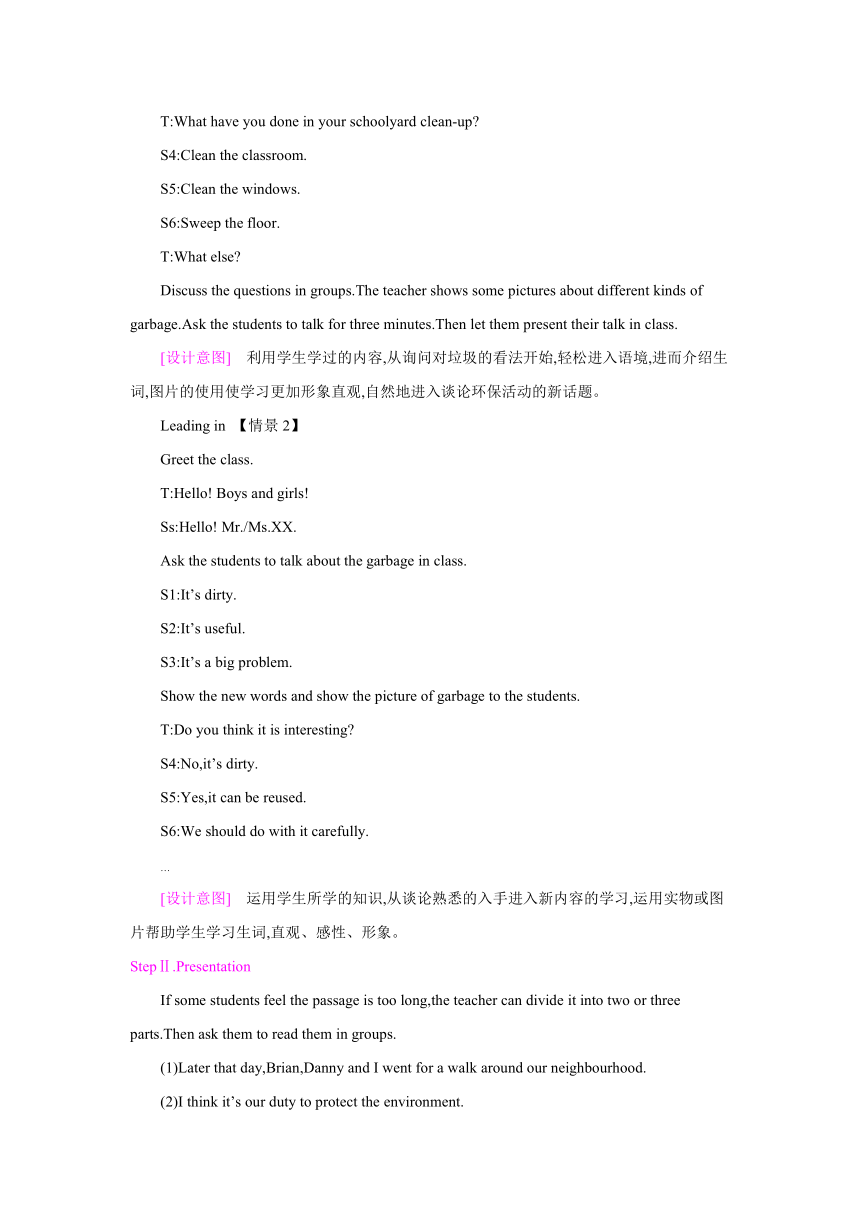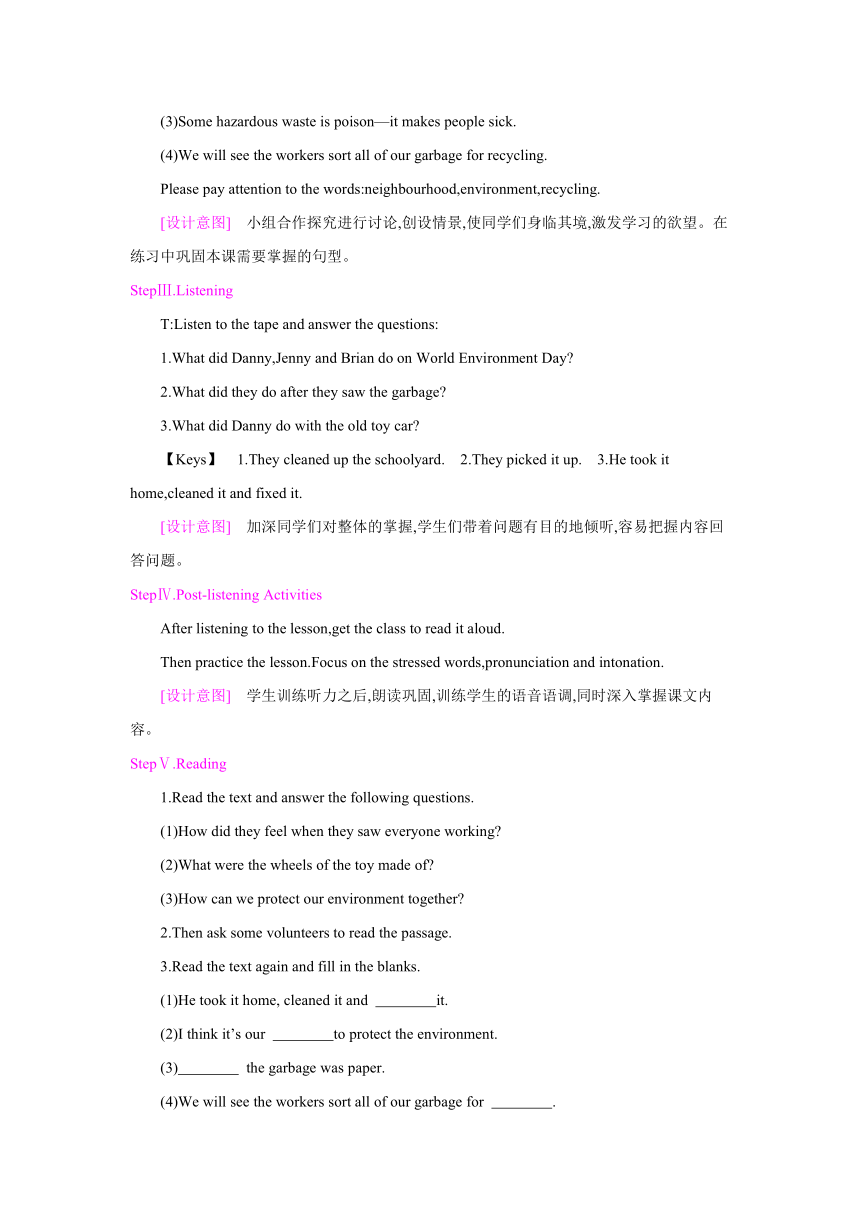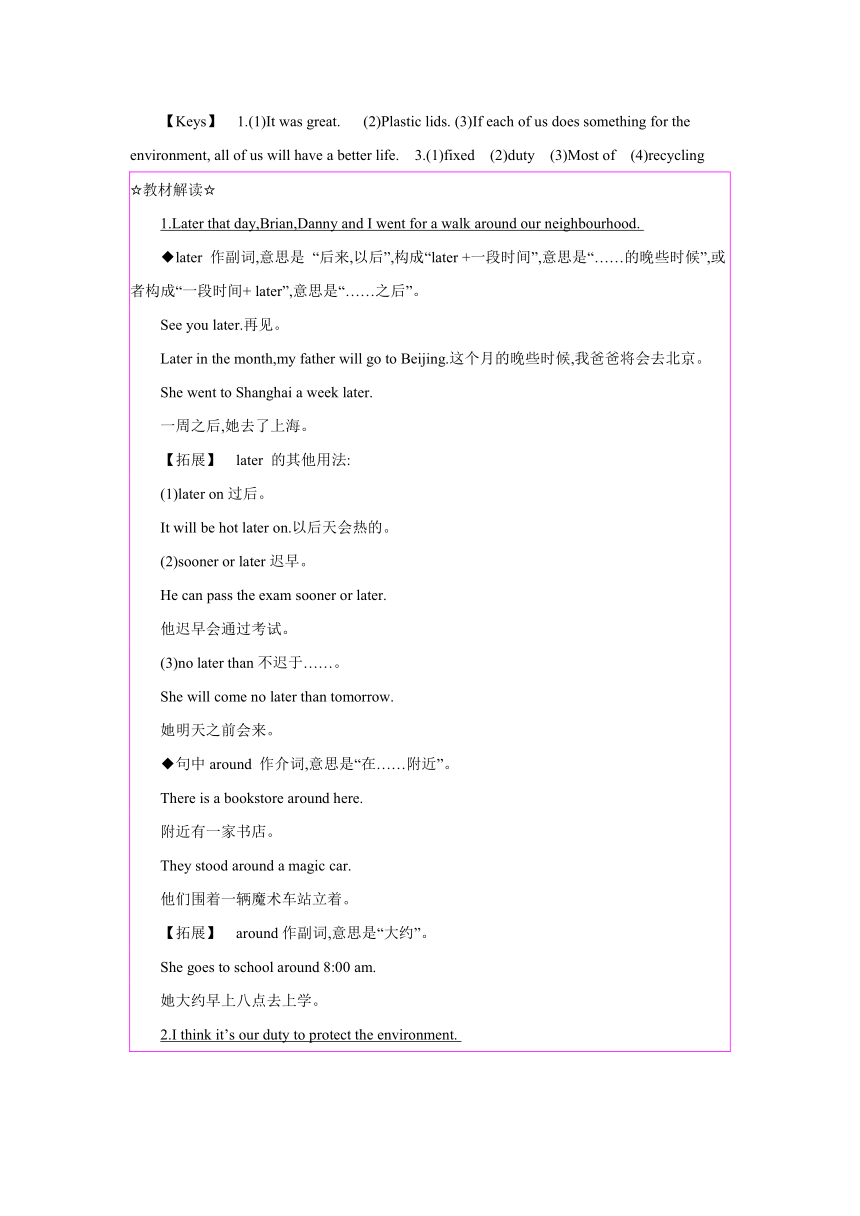Lesson 48 Garbage Is Interesting! 教学设计
文档属性
| 名称 | Lesson 48 Garbage Is Interesting! 教学设计 |

|
|
| 格式 | zip | ||
| 文件大小 | 28.6KB | ||
| 资源类型 | 教案 | ||
| 版本资源 | 冀教版 | ||
| 科目 | 英语 | ||
| 更新时间 | 2019-06-29 07:11:15 | ||
图片预览




文档简介
Lesson 48 Garbage Is Interesting!
教学目标:
1.掌握有关日记的写法。
2.掌握一些介绍环保活动的句型:Danny,Brian and I cleaned up the schoolyard.He took it home,cleaned it and fixed it.I think it’s our duty to protect the environment.
3.总结代词it的用法。
重点难点:
1.正确使用一些与环保有关的词: clean,protect,stop,sort,pollution,environment
2.正确运用所学知识介绍自己参加环保活动的情况。
3.掌握以下重点句式:It was great to see everyone working together!Most of the garbage was paper.We will see the workers sort all of our garbage for recycling.If each of us does something for the environment,all of us will have a better life.
教学思路:
本课时的教学内容是冀教版八年级下册英语第八单元的第六课时,主要涉及环保活动的介绍。在授课之前先让学生介绍自己参加环保活动的情况。课上可以通过让学生小组合作的形式进行相互交流;然后教师通过幻灯片、图片向学生展示各种环保活动的场景,并让学生用英语加以描述。学一学环保知识,掌握环保的重要性,培养环保意识,爱护好我们的家园。
教学准备:
设计教学PPT,录音机,多媒体,图片和单词卡片。
教学过程:
StepⅠ.Lead in
Leading in 【情景1】
T:Hello,boys and girls.Do you like garbage?
Ss:No.
T:Do you think garbage is interesting?
Ss:No.
T:What do you do with garbage?
S1:Throw it away.
S2:Recycle it.
S3:Reuse it.
T:What have you done in your schoolyard clean-up?
S4:Clean the classroom.
S5:Clean the windows.
S6:Sweep the floor.
T:What else?
Discuss the questions in groups.The teacher shows some pictures about different kinds of garbage.Ask the students to talk for three minutes.Then let them present their talk in class.
[设计意图] 利用学生学过的内容,从询问对垃圾的看法开始,轻松进入语境,进而介绍生词,图片的使用使学习更加形象直观,自然地进入谈论环保活动的新话题。
Leading in 【情景2】
Greet the class.
T:Hello! Boys and girls!
Ss:Hello! Mr./Ms.XX.
Ask the students to talk about the garbage in class.
S1:It’s dirty.
S2:It’s useful.
S3:It’s a big problem.
Show the new words and show the picture of garbage to the students.
T:Do you think it is interesting?
S4:No,it’s dirty.
S5:Yes,it can be reused.
S6:We should do with it carefully.
…
[设计意图] 运用学生所学的知识,从谈论熟悉的入手进入新内容的学习,运用实物或图片帮助学生学习生词,直观、感性、形象。
StepⅡ.Presentation
If some students feel the passage is too long,the teacher can divide it into two or three parts.Then ask them to read them in groups.
(1)Later that day,Brian,Danny and I went for a walk around our neighbourhood.
(2)I think it’s our duty to protect the environment.
(3)Some hazardous waste is poison—it makes people sick.
(4)We will see the workers sort all of our garbage for recycling.
Please pay attention to the words:neighbourhood,environment,recycling.
[设计意图] 小组合作探究进行讨论,创设情景,使同学们身临其境,激发学习的欲望。在练习中巩固本课需要掌握的句型。
StepⅢ.Listening
T:Listen to the tape and answer the questions:
1.What did Danny,Jenny and Brian do on World Environment Day?
2.What did they do after they saw the garbage?
3.What did Danny do with the old toy car?
【Keys】 1.They cleaned up the schoolyard. 2.They picked it up. 3.He took it home,cleaned it and fixed it.
[设计意图] 加深同学们对整体的掌握,学生们带着问题有目的地倾听,容易把握内容回答问题。
StepⅣ.Post-listening Activities
After listening to the lesson,get the class to read it aloud.
Then practice the lesson.Focus on the stressed words,pronunciation and intonation.
[设计意图] 学生训练听力之后,朗读巩固,训练学生的语音语调,同时深入掌握课文内容。
StepⅤ.Reading
1.Read the text and answer the following questions.
(1)How did they feel when they saw everyone working?
(2)What were the wheels of the toy made of?
(3)How can we protect our environment together?
2.Then ask some volunteers to read the passage.
3.Read the text again and fill in the blanks.
(1)He took it home, cleaned it and it.?
(2)I think it’s our to protect the environment.?
(3) the garbage was paper.?
(4)We will see the workers sort all of our garbage for .?
【Keys】 1.(1)It was great. (2)Plastic lids. (3)If each of us does something for the environment, all of us will have a better life. 3.(1)fixed (2)duty (3)Most of (4)recycling
☆教材解读☆
1.Later that day,Brian,Danny and I went for a walk around our neighbourhood.?
◆later 作副词,意思是 “后来,以后”,构成“later +一段时间”,意思是“……的晚些时候”,或者构成“一段时间+ later”,意思是“……之后”。
See you later.再见。
Later in the month,my father will go to Beijing.这个月的晚些时候,我爸爸将会去北京。
She went to Shanghai a week later.
一周之后,她去了上海。
【拓展】 later 的其他用法:
(1)later on过后。
It will be hot later on.以后天会热的。
(2)sooner or later迟早。
He can pass the exam sooner or later.
他迟早会通过考试。
(3)no later than不迟于……。
She will come no later than tomorrow.
她明天之前会来。
◆句中around 作介词,意思是“在……附近”。
There is a bookstore around here.
附近有一家书店。
They stood around a magic car.
他们围着一辆魔术车站立着。
【拓展】 around作副词,意思是“大约”。
She goes to school around 8:00 am.
她大约早上八点去上学。
2.I think it’s our duty to protect the environment.?
it是形式主语,真正的主语是to protect the environment,这种句式比较常见。当不定式作主语时,一般用代词it作形式主语,把真正的主语放在后面,也就是“It +be +adj.+to do sth.”,意思是“做某事是……”。
It is relaxing to listen to music.
听音乐令人放松。
It’s no use shouting.喊也没用。
3.Some hazardous waste is poison—it makes people sick.?
make sb sick是 “make +宾语 +形容词”结构,意思是“使某人处于某种状态”,其中 make是使役动词,意思是“使”,形容词sick 作宾语补足语。
They made the teacher angry.
他们使老师生气了。
【拓展】 (1)“make +宾语 +不带to 的不定式”意思是“让某人做某事”。
She always makes her mother wash her clothes.她总是让她妈妈给她洗衣服。
(2)“make +宾语 +名词”意思是“使某人成为什么”。
He made me his good friend.
他让我做他的好朋友。
(3)“make it +形容词 +动词不定式”,其中it是形式宾语。
The Internet makes it faster to contact each other.网络使互相联系更快了。
[设计意图] 学生通过阅读课文,掌握重点内容,并且通过回答问题来巩固对课文的理解和掌握;朗读课文进行填空练习,加深对课文的理解。
StepⅥ.Complete Let’s Do It!
Ask the students to read the passage again and again to finish No.1 and No.2 by themselves.
[设计意图] Let’s Do It! 部分中的No.1重点是阅读训练教学,针对课文内容。 No.2训练文中出现的重点单词和短语知识,让学生对基础知识有着细致深刻的掌握。
StepⅦ.Task
GROUP WORK:Let’s Do It! No.3
Ask students in groups to come to the front of the classroom,and they can present their ideas about hazardous waste.
[设计意图] No.3的重点是阅读练习,同学们通过小组合作来完成。以“有毒垃圾”为话题,提供了一个语境完整、内容丰富的话题,自然呈现本单元的核心句型,为学生进一步输出语言提供了口语示范。
StepⅧ.Exercises
T:Now,look at the sentences with some missing words.Please use proper words to fill them.
1.She bought a (二手的) guitar.?
2.Maybe we were (分开) three teams.?
3.She can book a (座位) today.?
4.My father has (大量的) things to do every day.?
5.Grapes can be (制成) wine.?
【Keys】 1.used 2.divided into 3.seat 4.tons of 5.made into
[设计意图] 以学评教、强化落实。当堂检测主要是由本节内容组成的形成性评价,利用已知的信息,让学生补充,让他们得到充分的训练。
StepⅨ.Homework
1.Practice the e-mail with your group members after class.
2.Copy the new words twice.
[设计意图] 口头练习和单词记忆相结合,复习、归纳,注重语言知识的操练与积累。
Lesson 48 Garbage Is Interesting!
used,divide,seat
make… out of…,tons of
Danny,Brian and I cleaned up the schoolyard.
He took it home,cleaned it and fixed it.
I think it’s our duty to protect the environment.
It was great to see everyone working together!
Most of the garbage was paper.
We will see the workers sort all of our garbage for recycling.
If each of us does something for the environment,all of us will have a better life.
教材习题解答
【Lesson 48】
1
This week
We learned about pollution.
On Tuesday
We cleaned up the schoolyard.
Later on Tuesday
We went for a walk around our neighbourhood.
On Wednesday
We sorted our school’s garbage.
Today
Danny made a car out of garbage!
Later this month
We will go on a class trip to the city recycling centre.
2 1.Let’s clean it up. 2.Let’s pick it up. 3.Let’s go for a walk. 4.Put on your coat.
【Unit Review】
Building Your Vocabulary
Ⅰ 1.rubbish 2.follow 3.pollute 4.waste 5.pollution
Ⅱ 1.pick up 2.throw away 3.More than 4.turn,off 5.Neither,nor
Grammar in Use
1.It is hard for us to finish the project in an hour.
2.It will be fun to go to the schoolyard to play. 3.It is not right to often waste paper. 4.It is our duty to protect the environment.
Putting It All Together
Ⅰ 1.He uses the cardboard for the car’s body. 2.He uses the ice cream lids for the car’s wheels. 3.He uses old metal cans for the headlights of the car.
Ⅱ Dear government,
Now we have many pollution problems in our city.There’re too many cars in the street.I think we should stop some of the cars from driving.This may reduce air pollution.If possible,we should plant more trees on both sides of the street.Our city will be more beautiful.I think it’s our duty to take care of our own city.
A pupil
语法精讲
it的用法
1.it最基本的用法是人称代词,代替刚提到的东西以避免重复。
This is not my book.It is John’s.
这不是我的书。它是约翰的。
2.it可用来代替this或that。
—What’s this?这是什么?
—It is a pencil.它是一支铅笔。
3.it可指婴儿或不明身份的人。
Someone is knocking at the door;please go and see who it is.有人在敲门。麻烦去看看是谁。
4.it指代时间或季节。
—What’s the time now?现在几点了?
—It is ten o’clock.十点钟。
5.it指代天气。
—What’s the weather like today?
今天的天气怎么样?
—It’s sunny.天气晴朗。
6.it指代距离。
How far is it from your school to your home?
从你家到学校有多远?
7.it用作形式主语,常用于以下句型中:
(1)It is + adj.+ (for sb.) to do sth.(对某人来说)做某事……。
It is important for us to work hard.
努力学习对我们来说很重要。
(2)It’s time to do/for/that….到……时间了。
It’s time to get up/for lunch/that we go home.是起床/吃午饭/回家的时间了。
(3)It seems that…看起来像……。
It seems that he is quite happy.
看起来他很开心。
(4)It’s one’s turn to do…轮到某人做……。
It’s your turn to clean the room.
轮到你打扫房间了。
(5)It’s +adj.+that从句。
It’s necessary that you should be present at the meeting.你有必要出席会议。
8.it作形式宾语。
I find it difficult to solve the problem.
我发现解决这个问题很难。
9.强调句型“It is/was +被强调部分+ that/who/whom+其他成分”。
It is our hope that our city becomes more and more beautiful.我们的城市变得越来越美丽是我们的愿望。
教学目标:
1.掌握有关日记的写法。
2.掌握一些介绍环保活动的句型:Danny,Brian and I cleaned up the schoolyard.He took it home,cleaned it and fixed it.I think it’s our duty to protect the environment.
3.总结代词it的用法。
重点难点:
1.正确使用一些与环保有关的词: clean,protect,stop,sort,pollution,environment
2.正确运用所学知识介绍自己参加环保活动的情况。
3.掌握以下重点句式:It was great to see everyone working together!Most of the garbage was paper.We will see the workers sort all of our garbage for recycling.If each of us does something for the environment,all of us will have a better life.
教学思路:
本课时的教学内容是冀教版八年级下册英语第八单元的第六课时,主要涉及环保活动的介绍。在授课之前先让学生介绍自己参加环保活动的情况。课上可以通过让学生小组合作的形式进行相互交流;然后教师通过幻灯片、图片向学生展示各种环保活动的场景,并让学生用英语加以描述。学一学环保知识,掌握环保的重要性,培养环保意识,爱护好我们的家园。
教学准备:
设计教学PPT,录音机,多媒体,图片和单词卡片。
教学过程:
StepⅠ.Lead in
Leading in 【情景1】
T:Hello,boys and girls.Do you like garbage?
Ss:No.
T:Do you think garbage is interesting?
Ss:No.
T:What do you do with garbage?
S1:Throw it away.
S2:Recycle it.
S3:Reuse it.
T:What have you done in your schoolyard clean-up?
S4:Clean the classroom.
S5:Clean the windows.
S6:Sweep the floor.
T:What else?
Discuss the questions in groups.The teacher shows some pictures about different kinds of garbage.Ask the students to talk for three minutes.Then let them present their talk in class.
[设计意图] 利用学生学过的内容,从询问对垃圾的看法开始,轻松进入语境,进而介绍生词,图片的使用使学习更加形象直观,自然地进入谈论环保活动的新话题。
Leading in 【情景2】
Greet the class.
T:Hello! Boys and girls!
Ss:Hello! Mr./Ms.XX.
Ask the students to talk about the garbage in class.
S1:It’s dirty.
S2:It’s useful.
S3:It’s a big problem.
Show the new words and show the picture of garbage to the students.
T:Do you think it is interesting?
S4:No,it’s dirty.
S5:Yes,it can be reused.
S6:We should do with it carefully.
…
[设计意图] 运用学生所学的知识,从谈论熟悉的入手进入新内容的学习,运用实物或图片帮助学生学习生词,直观、感性、形象。
StepⅡ.Presentation
If some students feel the passage is too long,the teacher can divide it into two or three parts.Then ask them to read them in groups.
(1)Later that day,Brian,Danny and I went for a walk around our neighbourhood.
(2)I think it’s our duty to protect the environment.
(3)Some hazardous waste is poison—it makes people sick.
(4)We will see the workers sort all of our garbage for recycling.
Please pay attention to the words:neighbourhood,environment,recycling.
[设计意图] 小组合作探究进行讨论,创设情景,使同学们身临其境,激发学习的欲望。在练习中巩固本课需要掌握的句型。
StepⅢ.Listening
T:Listen to the tape and answer the questions:
1.What did Danny,Jenny and Brian do on World Environment Day?
2.What did they do after they saw the garbage?
3.What did Danny do with the old toy car?
【Keys】 1.They cleaned up the schoolyard. 2.They picked it up. 3.He took it home,cleaned it and fixed it.
[设计意图] 加深同学们对整体的掌握,学生们带着问题有目的地倾听,容易把握内容回答问题。
StepⅣ.Post-listening Activities
After listening to the lesson,get the class to read it aloud.
Then practice the lesson.Focus on the stressed words,pronunciation and intonation.
[设计意图] 学生训练听力之后,朗读巩固,训练学生的语音语调,同时深入掌握课文内容。
StepⅤ.Reading
1.Read the text and answer the following questions.
(1)How did they feel when they saw everyone working?
(2)What were the wheels of the toy made of?
(3)How can we protect our environment together?
2.Then ask some volunteers to read the passage.
3.Read the text again and fill in the blanks.
(1)He took it home, cleaned it and it.?
(2)I think it’s our to protect the environment.?
(3) the garbage was paper.?
(4)We will see the workers sort all of our garbage for .?
【Keys】 1.(1)It was great. (2)Plastic lids. (3)If each of us does something for the environment, all of us will have a better life. 3.(1)fixed (2)duty (3)Most of (4)recycling
☆教材解读☆
1.Later that day,Brian,Danny and I went for a walk around our neighbourhood.?
◆later 作副词,意思是 “后来,以后”,构成“later +一段时间”,意思是“……的晚些时候”,或者构成“一段时间+ later”,意思是“……之后”。
See you later.再见。
Later in the month,my father will go to Beijing.这个月的晚些时候,我爸爸将会去北京。
She went to Shanghai a week later.
一周之后,她去了上海。
【拓展】 later 的其他用法:
(1)later on过后。
It will be hot later on.以后天会热的。
(2)sooner or later迟早。
He can pass the exam sooner or later.
他迟早会通过考试。
(3)no later than不迟于……。
She will come no later than tomorrow.
她明天之前会来。
◆句中around 作介词,意思是“在……附近”。
There is a bookstore around here.
附近有一家书店。
They stood around a magic car.
他们围着一辆魔术车站立着。
【拓展】 around作副词,意思是“大约”。
She goes to school around 8:00 am.
她大约早上八点去上学。
2.I think it’s our duty to protect the environment.?
it是形式主语,真正的主语是to protect the environment,这种句式比较常见。当不定式作主语时,一般用代词it作形式主语,把真正的主语放在后面,也就是“It +be +adj.+to do sth.”,意思是“做某事是……”。
It is relaxing to listen to music.
听音乐令人放松。
It’s no use shouting.喊也没用。
3.Some hazardous waste is poison—it makes people sick.?
make sb sick是 “make +宾语 +形容词”结构,意思是“使某人处于某种状态”,其中 make是使役动词,意思是“使”,形容词sick 作宾语补足语。
They made the teacher angry.
他们使老师生气了。
【拓展】 (1)“make +宾语 +不带to 的不定式”意思是“让某人做某事”。
She always makes her mother wash her clothes.她总是让她妈妈给她洗衣服。
(2)“make +宾语 +名词”意思是“使某人成为什么”。
He made me his good friend.
他让我做他的好朋友。
(3)“make it +形容词 +动词不定式”,其中it是形式宾语。
The Internet makes it faster to contact each other.网络使互相联系更快了。
[设计意图] 学生通过阅读课文,掌握重点内容,并且通过回答问题来巩固对课文的理解和掌握;朗读课文进行填空练习,加深对课文的理解。
StepⅥ.Complete Let’s Do It!
Ask the students to read the passage again and again to finish No.1 and No.2 by themselves.
[设计意图] Let’s Do It! 部分中的No.1重点是阅读训练教学,针对课文内容。 No.2训练文中出现的重点单词和短语知识,让学生对基础知识有着细致深刻的掌握。
StepⅦ.Task
GROUP WORK:Let’s Do It! No.3
Ask students in groups to come to the front of the classroom,and they can present their ideas about hazardous waste.
[设计意图] No.3的重点是阅读练习,同学们通过小组合作来完成。以“有毒垃圾”为话题,提供了一个语境完整、内容丰富的话题,自然呈现本单元的核心句型,为学生进一步输出语言提供了口语示范。
StepⅧ.Exercises
T:Now,look at the sentences with some missing words.Please use proper words to fill them.
1.She bought a (二手的) guitar.?
2.Maybe we were (分开) three teams.?
3.She can book a (座位) today.?
4.My father has (大量的) things to do every day.?
5.Grapes can be (制成) wine.?
【Keys】 1.used 2.divided into 3.seat 4.tons of 5.made into
[设计意图] 以学评教、强化落实。当堂检测主要是由本节内容组成的形成性评价,利用已知的信息,让学生补充,让他们得到充分的训练。
StepⅨ.Homework
1.Practice the e-mail with your group members after class.
2.Copy the new words twice.
[设计意图] 口头练习和单词记忆相结合,复习、归纳,注重语言知识的操练与积累。
Lesson 48 Garbage Is Interesting!
used,divide,seat
make… out of…,tons of
Danny,Brian and I cleaned up the schoolyard.
He took it home,cleaned it and fixed it.
I think it’s our duty to protect the environment.
It was great to see everyone working together!
Most of the garbage was paper.
We will see the workers sort all of our garbage for recycling.
If each of us does something for the environment,all of us will have a better life.
教材习题解答
【Lesson 48】
1
This week
We learned about pollution.
On Tuesday
We cleaned up the schoolyard.
Later on Tuesday
We went for a walk around our neighbourhood.
On Wednesday
We sorted our school’s garbage.
Today
Danny made a car out of garbage!
Later this month
We will go on a class trip to the city recycling centre.
2 1.Let’s clean it up. 2.Let’s pick it up. 3.Let’s go for a walk. 4.Put on your coat.
【Unit Review】
Building Your Vocabulary
Ⅰ 1.rubbish 2.follow 3.pollute 4.waste 5.pollution
Ⅱ 1.pick up 2.throw away 3.More than 4.turn,off 5.Neither,nor
Grammar in Use
1.It is hard for us to finish the project in an hour.
2.It will be fun to go to the schoolyard to play. 3.It is not right to often waste paper. 4.It is our duty to protect the environment.
Putting It All Together
Ⅰ 1.He uses the cardboard for the car’s body. 2.He uses the ice cream lids for the car’s wheels. 3.He uses old metal cans for the headlights of the car.
Ⅱ Dear government,
Now we have many pollution problems in our city.There’re too many cars in the street.I think we should stop some of the cars from driving.This may reduce air pollution.If possible,we should plant more trees on both sides of the street.Our city will be more beautiful.I think it’s our duty to take care of our own city.
A pupil
语法精讲
it的用法
1.it最基本的用法是人称代词,代替刚提到的东西以避免重复。
This is not my book.It is John’s.
这不是我的书。它是约翰的。
2.it可用来代替this或that。
—What’s this?这是什么?
—It is a pencil.它是一支铅笔。
3.it可指婴儿或不明身份的人。
Someone is knocking at the door;please go and see who it is.有人在敲门。麻烦去看看是谁。
4.it指代时间或季节。
—What’s the time now?现在几点了?
—It is ten o’clock.十点钟。
5.it指代天气。
—What’s the weather like today?
今天的天气怎么样?
—It’s sunny.天气晴朗。
6.it指代距离。
How far is it from your school to your home?
从你家到学校有多远?
7.it用作形式主语,常用于以下句型中:
(1)It is + adj.+ (for sb.) to do sth.(对某人来说)做某事……。
It is important for us to work hard.
努力学习对我们来说很重要。
(2)It’s time to do/for/that….到……时间了。
It’s time to get up/for lunch/that we go home.是起床/吃午饭/回家的时间了。
(3)It seems that…看起来像……。
It seems that he is quite happy.
看起来他很开心。
(4)It’s one’s turn to do…轮到某人做……。
It’s your turn to clean the room.
轮到你打扫房间了。
(5)It’s +adj.+that从句。
It’s necessary that you should be present at the meeting.你有必要出席会议。
8.it作形式宾语。
I find it difficult to solve the problem.
我发现解决这个问题很难。
9.强调句型“It is/was +被强调部分+ that/who/whom+其他成分”。
It is our hope that our city becomes more and more beautiful.我们的城市变得越来越美丽是我们的愿望。
同课章节目录
- Unit 1 Spring Is Coming
- Lesson 1 How's the weather?
- Lesson 2 It's Getting Warmer!
- Lesson 3 Sun Is Rising
- Lesson 4 The Spring City
- Lesson 5 Babysitting on a Spring Day
- Lesson 6 Stories about Spring
- Unit 2 Plant a Plant
- Lesson 7 Planting Trees
- Lesson 8 Why Are Plants Important?
- Lesson 9 Gardening with Mary
- Lesson 10 Make Your Garden Grow!
- Lesson 11 Amazing Plants
- Lesson 12 Danny's Plant
- Unit 3 Animals Are Our Friends
- Lesson 13 Danny's Big Scare
- Lesson 14 Amazing Animals
- Lesson 15 The Zoo Is Open
- Lesson 16 The Pear Escaped
- Lesson 17 Save the Tigers
- Lesson 18 Friendship Between Animals
- Unit 4 The Internet Connects Us
- Lesson 19 How Do You Use the Internet?
- Lesson 20 A Computer Helps!
- Lesson 21 Books or Computers?
- Lesson 22 Travel on the Internet
- Lesson 23 The Internet--Good or Bad?
- Lesson 24 An E-mail to Grandpa
- Unit 5 Buying and Selling
- Lesson 25 Raising Money
- Lesson 26 Cookies, Please!
- Lesson 27 Business English
- Lesson 28 Ms. Liu's Great Idea
- Lesson 29 How to Push a Product
- Lesson 30 A Cookie Sale
- Unit 6 Be a Champion!
- Lesson 31 Don't Fall, Danny
- Lesson 32 My Favourite Record
- Lesson 33 2800 Years of Sports
- Lesson 34 Modern Olympics
- Lesson 35 The Dream Team
- Lesson 36 Classroom Olympics
- Unit 7 Know Our World
- Lesson 37 Let's Learn Geography!
- Lesson 38 The World Is a Big Place
- Lesson 39 Ring Up or Call?
- Lesson 40 Body Language
- Lesson 41 A Class of the World
- Lesson 42 North America
- Unit 8 Save Our World
- Lesson 43 Let's Clean Up!
- Lesson 44 Environment Clubs
- Lesson 45 Let's Sort Garbage!
- Lesson 46 Protect Our Environment
- Lesson 47 Connected to Nature
- Lesson 48 Garbage Is Interesting!
